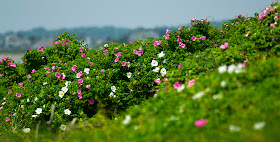Before the vitamin C-packed rosehips develop later in the summer, we gather the fragrant petals from the flowers. The best time of day to gather the flower petals is late morning or early afternoon. They open each morning, become dusted with pollen around noon, and will drop their petals by late evening, leaving the pollinated and developing hip behind. By gently grasping the whole flower head with your hand and tugging the petals, you will often get most of the petals off easily. The hardest part is avoiding the prickers, and there is often poison ivy growing among the bushes, so be mindful and wear shoes and maybe even jeans when picking.
 |
| Thickets of white and pink flowered roses line the shore |
The petals contain the lovely rose smell, and are edible raw as a pretty garnish in salads. They can be added to cookie dough, like shortbread, for color and flavor. We also use them to make this wildly beautiful syrup, which we then use to add to seltzer for flavor, as a flavored syrup at breakfast, add to mixed cocktails like simple syrup, and as a base for a floral sorbet. At first, the color will be a dull purple, but adding the ascorbic acid powder will create the intense pink and preserve the syrup. We buy bulk powdered ascorbic acid from the local vitamin shop, it is more commonly known as vitamin C. You could use this recipe for roses you have in your yard, as long as you have not sprayed the roses with chemicals. Many hybridized and domesticated roses no longer have the heady fragrance of wild roses, though, so we prefer the wild roses for this recipe.
Rose Petal Syrup makes about 4 cups of syrup
2 1/4 c. water
3 c. granulated sugar
2 c. packed rose petals, coarsely chopped
3 Tbsp. ascorbic acid powder
1. Heat the water to boiling and add the sugar. Remove from the heat, and stir until the sugar dissolves.
2. Allow the sugar syrup to cool to 80°F, then stir in the chopped rose petals. Cover the pot and let the flowers steep in the syrup for 24 hours.
3. Filter out the flowers and squeeze them well to extract all the flavor. Filter the syrup through a fine mesh coffee filter.
4. Remove 1 cup of the syrup, and warm it in a saucepan. Add the ascorbic acid, using a whisk to dissolve it. Add the warmed syrup back to the remainder, and mix it all well.
5. Store in airtight, sterilized glass containers in a dark place, up to a year.



We have a few behind our property. I think they are pink. I may just have to make this. Thanks!
ReplyDeleteGreat! I have gotten a local reputation for my rose petal jam, made with the super fragrant petals of a rugosa rose. Also unforgettable: rose meringue pie, made using the lemon meringue pie recipe as a basis but omitting the lemons, of course. The only thing is that cooking the pie causes the vibrant fuchsia color to dull to a pink-gray. But the flavor remains.
ReplyDeleteI would like to thank you for the efforts you have made in writing this article. I am hoping the same best work from you in the future as well.
ReplyDeleteThanks for the nice and helpful information..
ReplyDeleteGood one
Lovely to hear your experiences, we forage regularly and have done for many years now, we feel it adds a little something special to our lives to have collected and made something that was there "doing its natural thing" waiting for us to harvest it.
ReplyDeleteWell done and thank you very much for recording your fun for us!
Thanks for the recipes too - it can be frustrating when you read of something lovely to do and dont have full information of how to do it yourself.